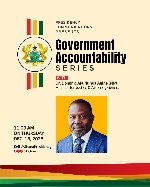Wi-Fi for schools programme: Reports ‘inaccurate,’ disregard ‘erroneous impression’ created – Education Ministry tells public
 Ministry of Education spokesperson Kwasi Kwarteng
Ministry of Education spokesperson Kwasi Kwarteng
The Ministry of Education has said it is committed to “ensuring value for money” in all its initiatives under the leadership of the current Minister, Dr. Yaw Osei Adutwum.
This comes on the back of a recent report regarding regarding the Wi-Fi for Schools Programme suggestinga failure in service delivery and misuse of public funds.
A statement issued by the Ministry of Education, signed by its spokesperson Kwasi Kwarteng said the report by the Fourth Estate is “inaccurate and does not represent the facts.”
It clarified that the Ministry secured Public Procurement Authority (PPA) approval for two phases of the project: “Phase 1 beginning in August 2019, to engage Busy Internet Ghana Limited for Wi-Fi provision in 717 Senior High Schools at the cost of GHS 59,909, 658.00.
“This covered supply, installation, and maintenance of hardware devices, with a recurring sum of dedicated internet not exceeding GHS2,673,013.44.”
While phase 2 of the project expanded the scope to include all “16 Regional Education Directorates/offices, 46 Colleges of Education, and 260 District Education Offices of GES at a cost of GHS24,500,000.00 plus a recurring monthly dedicated internet of an amount not exceeding GHS 3,700,000.00. “
The total contract sum amounted to “GHS 84 million, covering hardware supply, installation, maintenance, training, and testing across 1,013 institutions (sites) including SHSs, Colleges of Education, Regional, and District Offices of Education.”
In line with the review clause in the contract signed in 2019, an upward review of monthly recurring costs was approved by the PPA and capped to an amount not exceeding GHS 11,522,661.81 in 2023 due to the prevailing inflation, and foreign exchange rates.
It emphasised that despite the approved amount of recurring expenditure, “the Ministry only pays for the accessible dedicated internet and not necessarily the total capped monthly cost.”
With regards to payment, it indicated that “specifically, the contract provides that the supplier shall be compensated on a pro-rata basis. The effect is that any downtime up to and exceeding half of a particular month will not be paid for. This means that despite the approved amount of recurring expenditure, the Ministry does not pay a pesewa if services does not reach the 50 per cent (less than half of the month) threshold in a particular month.”
The Ministry clarified, it employs various monitoring mechanisms, including “reporting lines from ICT coordinators in schools, Wi-Fi monitoring tools, and a Network Operating Room,” aimed at ensuring timely detection and resolution of connectivity issues in the institutions nationwide while helping the Ministry to know how much of the service to pay within a particular month.
The statement revealed that the contract provides for a committee made up of “MoE, GES, NaCCa and NCA to vet all invoices and certify before payment is made to Lifted Logistics Limited (formerly, Busy Internet).”
While there is also “Validation Committee set up by the Minister for Education to equally vet all invoices before payment is made to the vendor,” the statement intimated.
It however noted that the upon evaluation the Ministry is considering “terminating aspects of the contract in schools that are experiencing satellite connectivity challenges, a situation which had been attributed to the failure of Lifted Logistics' Limited (formerly Busy Internet) to pay its providers.”
The Ministry also reassured the Public of Government’s dedication to improve education with the aim of achieving socioeconomic transformation.”
It therefore urged the public to disregard the “erroneous impression” created by this publication from the Fourth Estate Media and any such.
Source: classfmonline.com/Elikem Adiku
Trending News

Housing Project: President Mahama launches Oxygen City in Volta, reaffirms commitment to equitable regional development
23:20
Citizen Ato Dadzie praises Lordina Mahama's humility
16:05
Yoruba Kingdom honours Prez. Mahama for global leadership
15:28
Midwifery hackathon aims to reduce maternal mortality in Ghana
15:32
KAA 2028 campaign denounces false claims of endorsing President Mahama
15:15
'Government Accountability Series': Attorney General, Justice Minister speaks tomorrow Dec 18
20:02
Asantehene arrives in Accra to present Bawku conflict mediation report to President Mahama
15:52
Coalition of Unpaid Nurses demands immediate payment of arrears, threaten strike
15:11
Namibian Parliamentary delegation visits Ghana’s National Petroleum Authority for study tour
15:11
Ablekuma West MP begins local production of pavement blocks ahead of community road paving project
15:02




